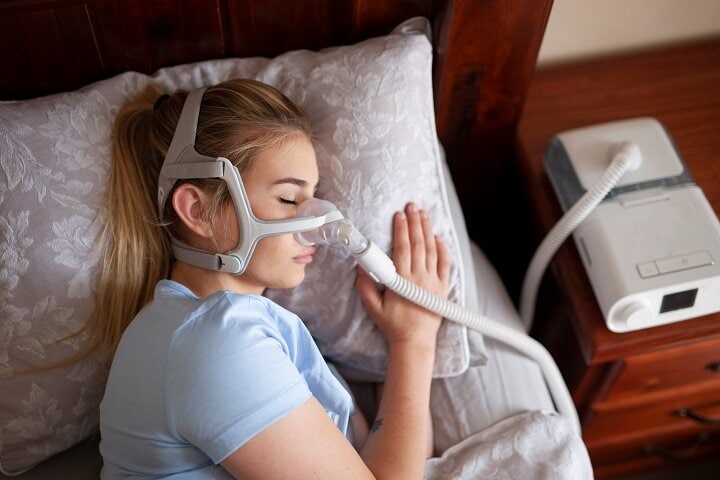What Is Sleep Apnea and How to Manage It

Sleep apnea is a common sleep disorder characterized by intermittent cessation or reduction of airflow during sleep, leading to fragmented and poor-quality sleep.
This article aims to provide an overview of sleep apnea, including its causes, risk factors, types, symptoms, diagnosis, and treatment options.
By adopting a scientific and impartial approach, this article seeks to present the information in an objective and impersonal manner, devoid of personal pronouns.
The ultimate goal is to educate readers on sleep apnea management strategies, enhancing their understanding and promoting better sleep health.
Key Takeaways
- Sleep apnea can be caused by factors such as obesity, smoking, alcohol consumption, age, and anatomical abnormalities.
- Differentiating between obstructive and central sleep apnea is important for determining the appropriate treatment approach.
- Common symptoms of sleep apnea include loud snoring, pauses in breathing during sleep, excessive daytime sleepiness, morning headaches, and difficulty concentrating.
- Managing sleep apnea involves various treatment options such as CPAP therapy, oral appliances, surgery, positional therapy, as well as lifestyle changes like weight loss, exercise, avoiding alcohol and sedatives, and maintaining a consistent sleep schedule.
Causes and Risk Factors of Sleep Apnea
The causes and risk factors of sleep apnea are multifactorial and can include:
- Obesity: Excess weight can lead to the narrowing of the airways, making it more difficult for air to pass through during sleep.
- Smoking and alcohol consumption: These habits can contribute to the development of sleep apnea by causing inflammation and relaxation of the airway muscles.
- Age: As individuals age, the muscles that control the airway become weaker and less able to keep the airway open during sleep.
- Certain anatomical abnormalities: Conditions such as a deviated septum or large tonsils can obstruct the airway and increase the likelihood of sleep apnea.
Prevention strategies for sleep apnea include:
- Maintaining a healthy weight through diet and exercise.
- Avoiding smoking and excessive alcohol consumption.
- Seeking treatment for any underlying anatomical abnormalities.
Types of Sleep Apnea
Obstructive and central are two types of sleep apnea.
Obstructive apnea occurs when the airway becomes partially or completely blocked during sleep, leading to pauses in breathing. This is often caused by the relaxation of the muscles in the throat, which can obstruct the flow of air.
On the other hand, central apnea is characterized by a failure of the brain to send proper signals to the muscles that control breathing. This results in a lack of effort to breathe rather than a physical obstruction.
It is important to differentiate between these two types of sleep apnea, as the treatment approaches may differ.
- Obstructive apnea:
- Airway blockage
- Relaxation of throat muscles
- Pauses in breathing
- Central apnea:
- Failure of brain signals
- Lack of effort to breathe
Symptoms and Diagnosis of Sleep Apnea
One way to identify and diagnose sleep apnea is through the evaluation of symptoms and medical history. Common symptoms of sleep apnea include loud snoring, pauses in breathing during sleep, excessive daytime sleepiness, morning headaches, and difficulty concentrating. It is important for individuals experiencing these symptoms to consult with a healthcare professional for an accurate diagnosis.
Once diagnosed, there are various treatment options available for managing sleep apnea. Continuous positive airway pressure (CPAP) therapy is the most common treatment method, which involves wearing a mask over the nose or mouth during sleep to provide a steady flow of air to keep the airway open. Other treatment options include oral appliances, surgery, and positional therapy.
In addition to these treatment options, lifestyle changes such as weight loss, regular exercise, avoiding alcohol and sedatives, and maintaining a consistent sleep schedule can also be beneficial in managing sleep apnea.
Treatment Options for Sleep Apnea
Continuous positive airway pressure (CPAP) therapy, oral appliances, surgery, positional therapy, and lifestyle changes are treatment options often considered for individuals with sleep apnea. While CPAP therapy is the gold standard treatment, alternative therapies and surgical interventions can also be beneficial for certain patients.
Some alternative therapies that have shown promise include:
- Acupuncture: Stimulating specific points on the body to improve sleep quality and reduce sleep apnea symptoms.
- Yoga and Breathing Exercises: Focusing on deep breathing and relaxation techniques to strengthen respiratory muscles and improve airflow.
- Herbal Remedies: Certain herbs and supplements, such as chamomile and valerian root, may help promote better sleep and reduce sleep apnea symptoms.
- Weight Loss: Shedding excess weight can significantly improve sleep apnea symptoms, especially in cases where obesity is a contributing factor.
- Craniosacral Therapy: A gentle hands-on approach that aims to improve the movement and balance of cerebrospinal fluid, potentially reducing sleep apnea symptoms.
While alternative therapies can be helpful, surgical interventions may be necessary in severe cases or when other treatments have failed. Surgical options include uvulopalatopharyngoplasty (UPPP), genioglossus advancement, and maxillomandibular advancement. These procedures aim to remove excess tissue, reposition the jaw, or widen the airway to improve breathing during sleep. However, surgical interventions carry risks and should be considered on a case-by-case basis.
Lifestyle Changes to Manage Sleep Apnea
Adopting certain modifications to daily habits and routines has been shown to have a positive impact on the symptoms of sleep apnea. Incorporating diet changes can be one such modification.
A healthy diet, rich in fruits, vegetables, whole grains, and lean proteins, can aid in weight management, which is important for individuals with sleep apnea, as excess weight can worsen the condition. Additionally, avoiding heavy meals, especially close to bedtime, can help alleviate symptoms by reducing the risk of acid reflux and airway obstruction during sleep.
Alternative therapies, such as acupuncture and yoga, have also been explored as potential interventions for sleep apnea. Although research on the effectiveness of these therapies is limited, some studies suggest that they may help improve sleep quality and reduce the severity of sleep apnea symptoms.
Further research is needed to fully understand the efficacy of these lifestyle modifications in managing sleep apnea.
Frequently Asked Questions
Are There Any Alternative Treatments for Sleep Apnea Besides CPAP Therapy?
Alternative treatments for sleep apnea include the use of oral appliances. Studies have shown that oral appliances can be effective in managing sleep apnea by improving symptoms and reducing the severity of apneas and hypopneas.
Can Children Have Sleep Apnea?
Pediatric sleep apnea refers to the occurrence of sleep apnea in children. It is characterized by pauses in breathing during sleep. Signs and symptoms of sleep apnea in children may include snoring, restless sleep, daytime sleepiness, and behavioral problems.
Is Sleep Apnea a Hereditary Condition?
The hereditary nature of sleep apnea is a matter of ongoing research. While certain genetic factors have been identified as potential causes, more studies are needed to fully understand the role of genetics in the development and progression of sleep apnea.
Can Weight Loss Alone Cure Sleep Apnea?
The efficacy of weight loss as a standalone treatment for sleep apnea is a topic of ongoing research. Some studies suggest that weight loss can have significant benefits in managing sleep apnea by reducing the severity of symptoms and improving overall sleep quality. However, it is important to note that lifestyle changes, such as adopting a healthy diet and engaging in regular physical activity, are often recommended alongside weight loss for optimal results in managing sleep apnea.
Can Sleep Apnea Be Cured Completely or Is It a Lifelong Condition?
Sleep apnea can be managed through various treatment options, but it is generally considered a chronic condition with no permanent cure. Long-term effects of sleep apnea treatment should be considered when determining the most appropriate approach.









